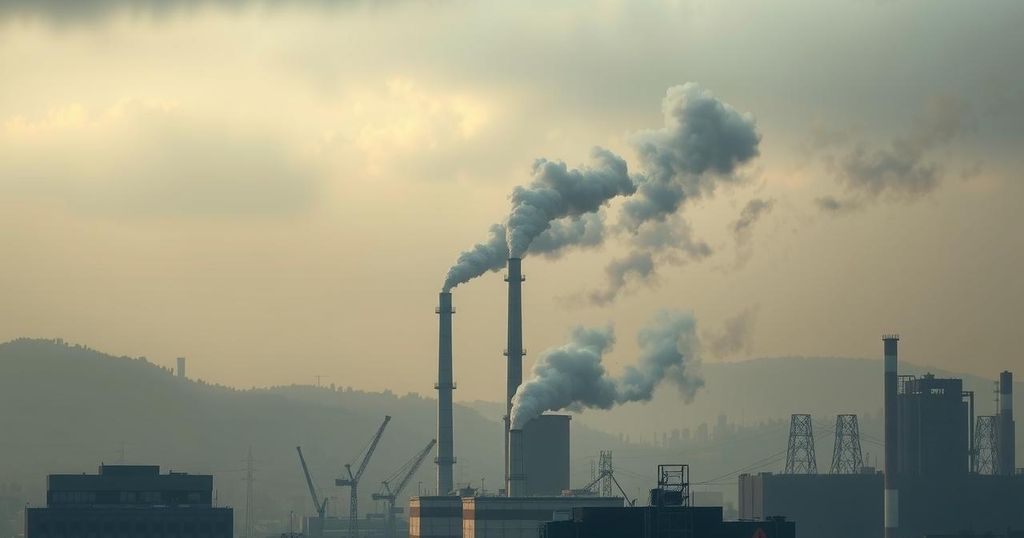Ghana, Nigeria, Chad, and Rwanda Among World’s Most Polluted Countries: 2024 Report

The 2024 World Air Quality Report reveals alarming air pollution levels in Ghana, Nigeria, Chad, and Rwanda, with Chad being the most polluted country. PM2.5 particles are particularly harmful, leading to increased mortality rates. Ghana’s air quality crisis is worsening rapidly, requiring urgent action to mitigate health risks and enhance environmental policies.
The 2024 World Air Quality Report indicates that Ghana, Nigeria, Chad, and Rwanda are prominent among the world’s most polluted nations. The report emphasizes an escalating air quality crisis that threatens millions of lives across Africa. Air pollution has become a serious public health concern in many African countries, leading to significant mortality rates due to its adverse health effects.
Chad has the highest levels of pollution, with a concerning PM2.5 concentration of 91.8 µg/m³, almost 18 times above the World Health Organization (WHO) guideline of 5 µg/m³. Other countries like Nigeria and Rwanda follow, registering PM2.5 levels at 40.1 µg/m³ and 40.8 µg/m³ respectively. Ghana ranks 14th globally, with a particulary alarming PM2.5 level of 35.8 µg/m³, signifying a continued decline in air quality.
PM2.5 particles pose serious health hazards, infiltrating lungs and bloodstream, causing severe respiratory and cardiovascular diseases. These tiny pollutants are significantly smaller than dust and can go unnoticed, yet they are extremely harmful. The University of Chicago’s data indicates that polluted air reduces lifespans in affected regions by an average of 2.7 years, highlighting a dire public health crisis.
In Ghana alone, it is estimated that 28,000 lives are lost annually due to air pollution, equivalent to one death every 19 minutes. This pervasive issue continues to escalate, with pollution levels rising significantly over the years, prompting urgent concerns regarding the health risks posed by the toxic air.
Air pollution now significantly impacts Ghanaian cities, particularly Accra and Kumasi, where pollution levels have drastically increased. In the past two years, Ghana has moved from the 27th to the 14th position in terms of global pollution rankings. The dramatic rise in PM2.5 concentrations has pushed millions of Ghanaians into the path of harmful air.
The pollution crisis in Africa is compounded by inadequate air quality monitoring. The 2024 report reveals that five of the top ten most polluted countries are located in Africa. Furthermore, only 24 of Africa’s 54 nations provided air quality data, emphasizing the pervasive data gaps in urban areas, such as Lagos, which remains unaccounted due to insufficient reporting.
Air pollution represents not only an environmental disaster but also a critical national health crisis in Ghana. If the current trajectory continues, up to 2,333 individuals may die monthly as a direct result of toxic air exposure. The economic impact is similarly alarming, with projections suggesting that without intervention, Ghana’s urban air pollution could incur a cost of $137.8 billion by 2040.
Globally, the situation varies considerably. Only a small fraction of cities meet the WHO air pollution standards, while some countries maintain relatively clean air. In fact, the cleanest nations include Australia and New Zealand, with Nieuwoudtville in South Africa satisfying WHO standards.
Key factors contributing to Africa’s deteriorating air quality encompass rapid urbanization, population growth, industrial emissions, and unregulated waste combustion. Notably, non-government organizations now provide a significant portion of air quality data in Africa, indicating a crucial need for government oversight and improved monitoring systems.
In light of Ghana’s intensifying air pollution crisis, experts advocate for immediate action, which includes enhancing vehicle emission regulations, investing in renewable energy, expanding air quality monitoring frameworks, and enforcing strict anti-burning policies to mitigate industrial and household emissions. The necessity for proactive measures has never been more critical; otherwise, the air quality could become an even more significant health threat in the future.
The 2024 World Air Quality Report paints a troubling picture of pollution in Africa, with Ghana, Nigeria, Chad, and Rwanda ranking among the world’s most polluted countries. Rising PM2.5 levels present severe health risks, highlighting the urgent need for enhanced air quality measures. Addressing air pollution through effective policies, improved monitoring, and increased awareness is imperative to protect public health and ensure a sustainable future for the region.
Original Source: www.myjoyonline.com







